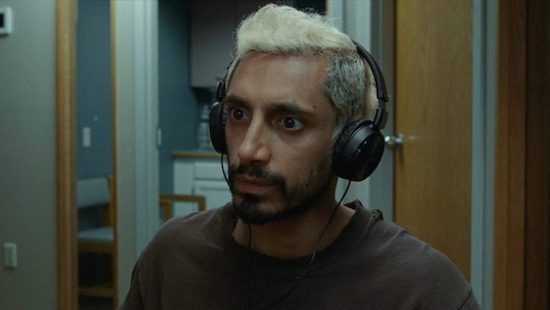‘Life is noise,’ reads the strapline to Darius Marder’s directorial debut Sound of Metal, an unorthodox drama about a drummer who loses his hearing. It opens with screeching, turbulent guitar feedback, as a grunge heavy metal duo perform a quaking gig. Lou (a nervy performance by Olivia Cooke), lead singer and guitarist, screams orgasmically: ‘Purify!’ Her lover, Ruben (an acting masterclass in wild-man sensitivity by Riz Ahmed), drums like a stoned wizard, wreathed in a halo of spit and sweat. To these two, silence might feel like death – and death haunts their love and art; a tattoo of crossed pistols on Reuben’s chest reads ‘Please kill me’. Yet this film asserts the beauty of silence. The sound design immerses us in the surf of Ruben’s ears, forcing the undeaf onto Marder’s subtitles, or leaving hearing suspended, making us question how we use noise to avoid life.
Our worship of the physicality of rock has silenced the deafness in our midst, though deaf artists have shaped Romantic music since Beethoven. Yet the ability to feel sound differently contributes to the trippy, ferocious and delicate sounds created by The Beach Boys’ Brian Wilson, The Who and Neil Young, whose tinnitus produced his Harvest Moon, in 1992, as a relief from unbearable loudness: a bright and dreamy album, chiming with steel guitar.
In Sound of Metal, Riz Ahmed, gleaming yet gaunt, embodies the archetype adulated by ableist rock myths. His eager, elfin face, beautiful biceps and bony intensity assure all comers that he’s fine, he’s cool, he’s on it. Ableism, with its love of the superhuman body, glamorises damage, as long as it stands, or staggers, on its own two feet. Wheelchairs and hearing aids aren’t sexy, but we adore seeing another human wreck themselves on drugs or fucking, in pursuit, supposedly, of higher insights. Sound of Metal isn’t simply a deaf memoir, nor a critique of ableism, though it’s partly both those things. Marder, who has the photographic eye of a poet and the generous mind of a novelist, embeds a deeper layer of trauma in the film. In a somewhat messy move that gives this quiet film a lot to say – perhaps too much – he makes Ruben a recovering addict, underscoring the lure of noise in the precarious haven the drummer has created for himself.
Lou and Ruben live in a silver camper van. Lou bears the scars of self-harming. Ruben’s sobriety is fragile. They wake daily to green juices and yoga squats and slow-dance to Delta Blues records. The scenes on-tour are Marder at his best: an Americana rock pastoral of highway concert dives, algae green meadows and morning sunlight rippling over Lou’s red hair like a William Egglestone photograph. Then, almost overnight, Ruben is out of the band, out of the album deal and, as he puts it ‘fucking deaf!’ Lou, looking scared, splits. Ruben embarks on a quest to retrieve his hearing and win back his woman.
Ruben’s fears echo other fates in rock, whether it’s cutting down on live performances like Ozzy Osbourne and Eric Clapton or being dropped like Brian Johnson, who was forced to leave ACDC by impending total deafness. Phil Collins, in a scene identical to Ruben, innocently attempted to escape his career-ending deafness by unpopping his ears. In 1967, The Who’s Keith Moon packed his drums with ten times their usual gunpowder, on American television. They exploded, and Pete Townshend went deaf in one ear. In 1976, the band went on to damage the rest of their hearing by staging the loudest ever gig at the time, registering over 126 decibels. In 1980, ACDC’s Back in Black tour whacked 130 decibels; in 1996, Leftfield cracked the ceiling at Brixton Academy with 137; Sleazy Joe thundered over 142 decibels in 2009. These days, some bands, like Pearl Jam, hand out ear plugs, but extreme noise feels like a necessary risk in rock, a counterpart to ‘the mystical black energy’ of addiction and its associated ‘emotional terrorism’ described by Red Hot Chilli Pepper’s Anthony Keidis, in his memoir Scar Tissue. Keidis, too, became aware of tinnitus after a single gig, writing of his ‘permanent ear damage… one of the hardest things to cure.’
The original deaf rock star with an identity crisis was Ludwig Van Beethoven. He scorned court etiquette in Vienna and threw rock n’ roll tantrums, refusing to play on command. Mozart had eaten in the kitchen, but Beethoven demanded a seat at the royal table. He glowered at parties, looking, his contemporary composer Luigi Cherubini famously remarked at the time, ‘like an unlicked bear cub.’ When Beethoven’s hearing began to fail, the higher notes were lost, the darker ones predominated. Composing, he would put a pencil in his mouth and touch the piano’s soundboard to feel its vibration. Shame and glory are the twin toxins of rock, and Ludwig was ashamed. In 1802, he wrote a letter to his brothers, explaining his decision, at 29, to commit suicide:
Ah, how could I possibly admit such an infirmity in the one sense which should have been more perfect in me than in others, a sense which I once possessed in highest perfection?
Beethoven didn’t kill himself. He described those four, ominous opening notes of his 5th Symphony, in 1808, as ‘fate knocking’ on his door. The maestro, once ashamed of his handicap, was making a public declaration of his deafness. Beethoven’s ‘infirmity’ shaped pop, blending high and low moods in a single movement and expressing a personal story. When hearing is impaired, one delights in the difference between high and low notes. As he aged, producing the sublime Late Quartets, Beethoven’s hands moved further apart on the piano. He demanded weightier instruments. He added keys, increasing resonance and pitch (Prince similarly ordered an extended piano for the British leg of his never-completed Piano And A Microphone tour). The 5th Symphony swerves from gloom to triumph, in a mix familiar to those expressions of Romantic music marrying fury and ecstasy today, whether it’s sludge metal or techno. Beethoven’s rebellious sound, shifting around a tectonic emotional core, laid a blueprint for 20th century rock.
Like Ruben, Beethoven was desperate for treatment. Disgusted by hearing trumpets, he stomped out notation, broke piano strings and covered manuscripts in sweat. His hobo-like appearance and unemptied chamber pots were justified, eventually, by a Herculean work ethic, taking years to produce symphonies. By contrast, musicians today must perpetually display their success, publicising inspiration before it’s matured. As Ruben says, ‘If I just sit here and diddle around, what am I going to have?’
Defying medical advice, Ruben blows his ears on a last gig. ‘What I need,’ he says, ‘is a fucking gun in my mouth.’ Ruben’s true handicap, Marder argues, is addiction: to fixing stuff, saving Lou, making shit happen. To appease Lou, Ruben admits himself into a deaf rehab community for addicts (played by actors from deaf backgrounds). Like many a hedonist, Ruben quickly – perhaps too quickly, in these scenes, to be credible – picks up the social tics and lingo of his new community (albeit that Ahmed spent months learning ASL). Secretly, since the community refuses to view deafness as needing ‘fixing’, he hustles for cochlear implants, behaving, as Joe (Paul Raci, in real life a child of deaf parents), the community’s leader points out, like an addict.
‘Have you had,’ challenges Joe, ‘moments of stillness? That place, that’s the kingdom of God. And that place will never desert you.’
While the worthy dialogue occasionally palls, the throbbing gyre of Ruben’s deteriorating hearing disorients and thrills. Working at a deaf school, finding himself listening to a pianist, Ruben joins the children in fondling the instrument’s reverberations. But as he strains to listen to the serene tune, the percussive pressure builds intolerably. His desire to hear, argues the film, is hurting him.
The song, significantly, is ‘Beelzebub, Rejoice!’, a collaboration between the Russian composer Thomas de Hartmann and the Armenian spiritual teacher Gurdijieff. Marder grew up in a community of Gurdijieff followers. Gurdijieff’s central teaching explores how to awaken ourselves from our state of half-living, or ‘waking sleep’, through intentional work, dance and music. We need to combine internal and physical experience, said Gurdijieff, in conversations recorded in P.D. Oupensky’s book, In Search Of The Miraculous, to raise our consciousness: ‘The different degrees of consciousness must be understood in oneself by sensation, by taste.’
Ruben’s therapy, in deaf rehab, is to taste this stillness and internalise it.
As an addict, Ruben reaches outside of himself for sensation, using his drumsticks to caress his girlfriend. Raising consciousness is a project dear to psychedelic rock yet Marder shuns rock grandeur, cutting from close-ups on anxious faces to rolling clouds and rustling trees. On Ruben’s travels to get implants, we breathe over his shoulder, in restrooms of palest chamomile and sickly blue. Following Lou to the home of her wealthy Parisian father, Ruben’s plane may glint like a dagger in a Tintoretto blue sky, but it’s a Tintoretto tinged with dishwater. At its climax, the film eschews heroism. Marder paints household objects with a deafening glory. Stacked silver cutlery and china plates glow like still lives. A spiral staircase embodies Ruben’s yearning ears. As Ruben is cruelly battered by the church bells of Paris, Marder asks, why cling to this addictive habit of hearing, of fixing, of wanting?
Ultimately, Marder defends non-hearing as a more perceptive, almost spiritual state. But in taking this position, the film glosses over the musical possibilities of alternative hearing, just like ableist rock lore. We can’t be certain it’s the deafness in one ear that makes him great, but Brian Wilson’s kaleidoscopic harmonies and fuzzy guitars in many Beach Boys songs echo Beethoven’s blended aural tones. Wilson’s mother, Audree said, ‘He doesn’t maybe hear like we do.’ Wilson himself described his ideas in 2016 as ‘using instruments as voices and voices as instruments. I would put sounds together to create something new.’
One wonders, too, if deaf viewers would want to be attributed with mystical insight? Addiction may require an all-or-nothing approach but deafness is not an absolutist state. By conflating the two, Marder doesn’t touch the daily, less dramatic adjustments of musicians living with partial deafness, like Kev Adams, ex-guitarist of Dexy’s Midnight Runners, who wrote to me recently by email: ‘My main problem is tinnitus. I have to be careful not to make it worse, or I need to take a break… which is heartbreaking as you can imagine.’
Nonetheless, Sound of Metal feels like a blessed intervention in the usual shock and awe of rock films that push artists towards that depressing cocktail of drugs and perfectionism that has slain too many of our musical idols. ‘I’m a control freak, and I want what I want and I want it immediately,’ writes Anthony Keidis in his memoir. By making a beautiful day in Paris clatter in Ruben’s ears like audio shrapnel, Marder reminds us that noise is heaven when you want it and hell when you don’t.
Sound of Metal is available now on Amazon Prime Video and released in cinemas from May 17th



